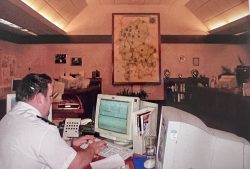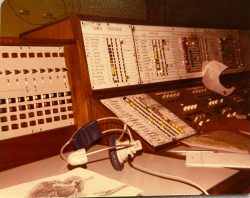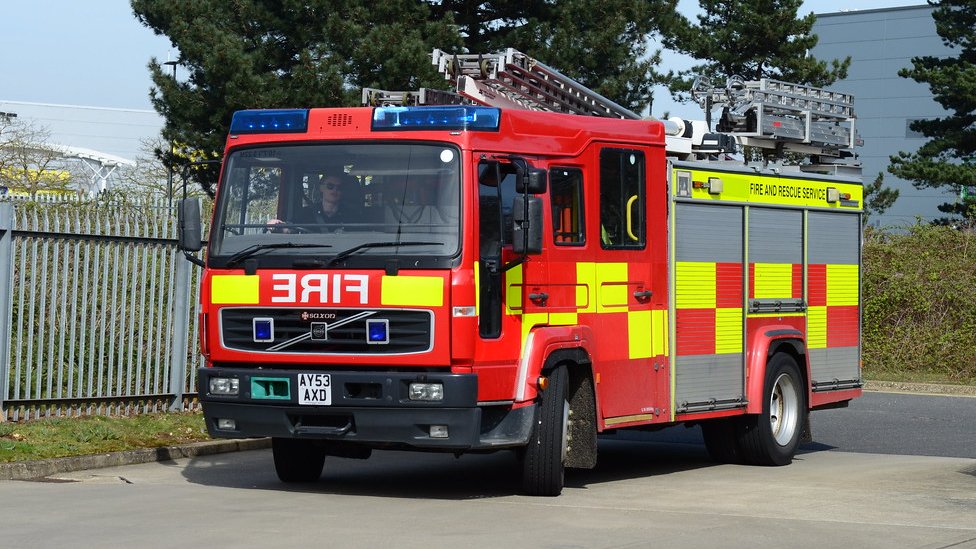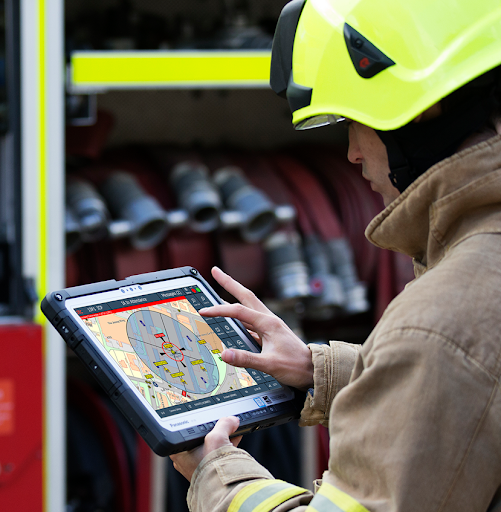The team working on our Guardian Public Safety Solution is primarily composed of ex-operators from control rooms all over the country. That isn’t accidental; we deliberately hire people who have firsthand experience using an ICCS and CAD every day, because they can best represent and advocate for our customers. To celebrate International Control Room Week 2025, we’re excited to share the stories of those who worked in fire control rooms.
Pete’s story
I joined Staffordshire Fire and Rescue Service (FRS) in 1997 as a fire control operator, and I worked there for almost 28 years. I’ve done pretty much every role you can do, from operating radios in the control room itself to managing national projects – but my favourite jobs were the front-facing operational roles because they’re so fast-paced.
I fell into the job almost by accident; I finished university, saw the position advertised, and just went for it. To this day, getting into the control room itself isn’t easy. There are hundreds, if not thousands, of people who apply for it – but once you’re in, it’s one of the few “jobs for life” that still exist.

Pete in the Staffordshire Fire control room, 1997
During my time in the Fire Service, I’ve helped to reorganise fire control rooms nationally and I’ve also been a national fire service representative on the Emergency Services Network (ESN). I think people have this perception that you join the fire service and that’s it, you do one job for life – but there are a thousand jobs within it. I’ve worked on lots of different things.
If I could tell the public one thing about the job, I’d say that control room staff are exposed to some terrible things. Even if it’s on the end of a phone or a radio, you still take it with you forever. The worst scenario for fire control operators is when a person is trapped in a building and you’re the only person they’re speaking to – it’s on you to keep them safe. But when the scenario ends happily, it’s the best feeling ever.
Sarah’s story
My dad was a firefighter in Essex for 30 years, so there’s family history there – I joined Essex County FRS two days before my 20th birthday, and I worked there for 16 years. I was a control room operator for nine years, then a crew manager, a temporary watch manager, and finally – after lots of assessments and training – a permanent watch manager. I worked with my dad for three of those years, and we were on the same watch, which meant I knew he’d be mobilised before he did! Just before I left to join Motorola Solutions in 2024, I took a temporary station manager promotion to write training for our new recruits. I really enjoyed doing that because I was able to leave a kind of parting gift for the service.
One thing that surprised me when I joined Motorola Solutions is that while all control rooms do the same job, they do it in so many different ways. Often, it’s down to the unique geographical features of the region; Essex, for example, has two international airports and several aerodromes, so we have plans in place to address those high-risk areas.
I’d like the public to know that when they call 999, it’s human nature to try and tell us everything that’s happening – but what we really need to know first is your location. That means if you get disconnected, we’ll be able to find you. Additionally, people often assume that they’re still speaking to the local fire station, so they’ll say things like, “it’s down the road next to the post box.” Control rooms are much more centralised than they used to be – we have as much local knowledge as possible, but we still need a bit more information than that!
I miss the control room environment – in an office job, you don’t get the camaraderie you have when you’re pretty much living with your colleagues for four days straight during night shifts. But working with the Guardian solution is a whole new world. It’s challenging and rewarding, especially when you can use your expertise to help other services.
Robert’s story
I worked for the Northern Ireland Fire and Rescue Service (NIFRS) for 37 years; the first 18 of those were in the control room, then I held a training role for 10 years. Finally, I moved into operational communications. At NIFRS, we train new recruits extensively – they all take a 10-week course which covers basically every element of the fire service.
I remember feeling really overwhelmed when I first walked into the control room at 18 years old. There were no computers when I started – it was all manual mobilizing – so I was just faced with loads of buttons and telephones and little markers for each resource down one wall. Luckily my trainers were great, so it all came together quickly for me.

The NIFRS control room as it looked when Robert joined in 1986
I think operators’ mental health is taken much more seriously now. Back in the day, there was less awareness of how stressful our jobs could be. I still remember my worst call, which was actually a hoax call; the caller said there was a large house fire in a very rural area of the country. They made it sound so realistic, it was horrible to be waiting for 20 to 25 minutes while the team tried to get there as quickly as possible. Despite all that, the role was so rewarding. The best moments were when we had a really busy shift and everyone pulled together to serve the community.
Lesley’s story
Before I became a control room operator, I worked in a bank and then a school. I had actually tried to become an operator before that, but didn’t get in – then I saw the advert to work for Northumberland FRS, applied, and was successful. I had young children at the time, and the shifts actually fit really well around childcare.
I ended up working for different FRSs for 27 years, starting as an operator and working my way up to watch manager. I loved the initial operator role the best – obviously I wanted to develop my skills and move on but even when I was a fire control manager, I would jump at the chance to put on a headset during busy conditions just so I could take a fire call again.
No matter how much technology develops, you simply can’t replace frontline control room staff. I sometimes hear the public saying, “oh, they just answer the phone,” and that is totally not the case: maintaining such a high level of concentration and keeping track of so many moving parts is extremely challenging. Having said that, I want the public to know that if you’re in any doubt about whether it’s a fire emergency or not, you should still call 999 because we’ll always do our absolute best to help you.
When I worked in Durham, we used to have an awards ceremony every year. One year, not long before I left, we got the chief fire officer’s award for the services that the control room had done for the organisation. That meant so much to me because it’s an entire group of people who help to answer every emergency call – truly a team effort.
For more information about our control room solutions, please visit motorolasolutions.com/guardian.




